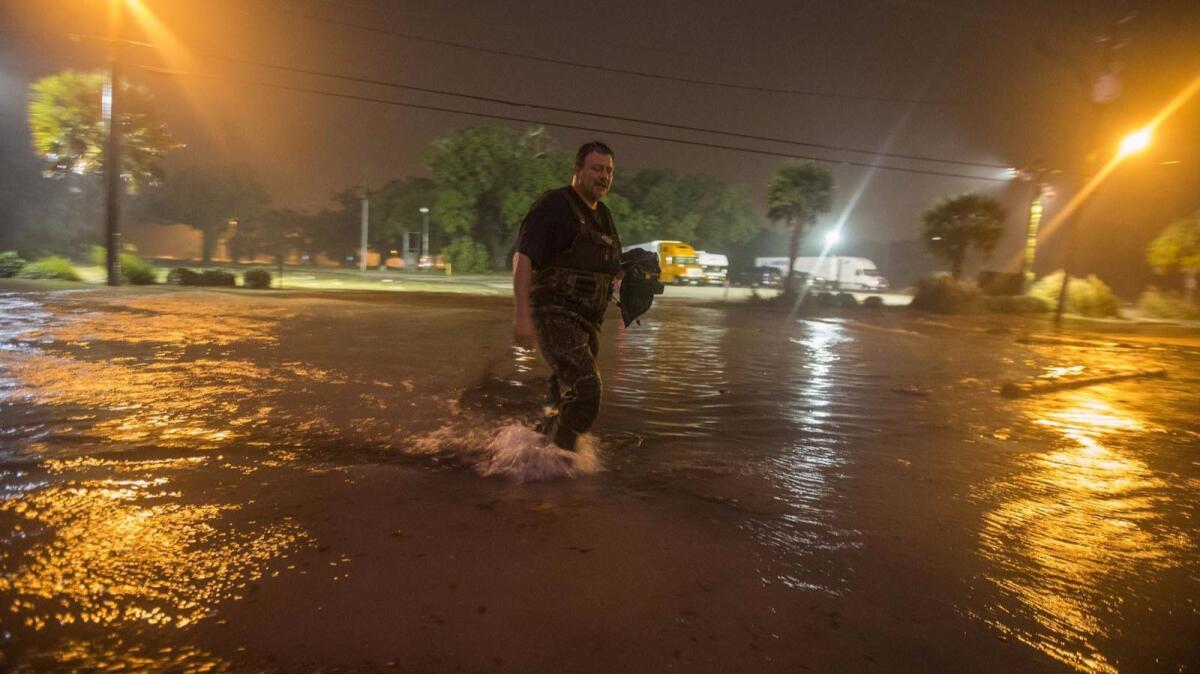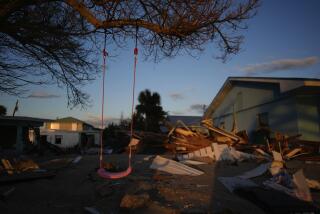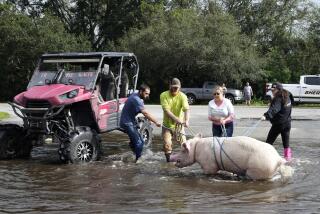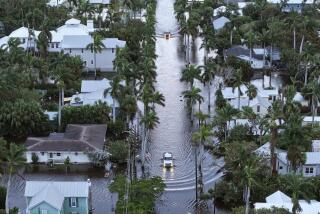Hurricane Nate drenches parts of South, but lacks punch of prior storms

Reporting from NEW ORLEANS â The fourth hurricane to hit the United States in 2017 was downgraded to a tropical depression Sunday after it made landfall in Louisiana and then Mississippi, damaging homes and flooding highways across the Gulf Coast and leaving more than 100,000 customers without power.
Across the coastal region, there was relief as Hurricane Nate spared seaside towns and rural areas the disastrous flooding and destruction of the last three hurricanes â Harvey, Irma and Maria â that pounded Southern states and Caribbean islands over the past six weeks.
Moving quickly, the storm weakened as it touched down as a Category 1 hurricane Saturday evening in Louisiana, on the mouth of the Mississippi River east of New Orleans and then made a second landfall just after midnight near Biloxi, Miss.
Officials in Louisiana, which experienced severe flooding last month after thunderstorms overwhelmed the drainage system, had imposed a curfew, terminated bus and streetcar services, and warned that power could be out for days.
By Sunday morning, there were no major drainage problems and the city resumed all bus and streetcar services. Entergy reported that about 300 customers were without power.
âHurricane Nate had the potential to wreak havoc on Louisiana, but thankfully, we were largely spared major damage,â Louisiana Gov. John Bel Edwards said in a statement. âBecause it moved so quickly, the damage was minimal in Louisiana. However, a shift of a mere 50 miles to the west would have brought damaging winds and life-threatening storm surges.â
The brunt of the storm was felt on the coast of Mississippi, which had not experienced a hurricane since Katrina hit in 2005.
State officials said the storm left 47,000 customers without power. In Jackson County, emergency management officials said at least 45 homes had water or wind damage after 70-mph winds and 10-foot storm surges coursed through the area. About 70 roads, including sections of U.S. Highway 90, flooded and up to 40 were blocked by downed trees and debris, emergency officials said.
If we had to have a storm, this was not a bad one to have.
— Earl Etheridge, director of emergency services for Jackson County, Miss.
In Biloxi, a coastal town where Katrina destroyed thousands of homes and businesses, storm water flooded the first floor of the Hard Rock Hotel and Casino Biloxi and the Golden Nugget Biloxi, as well as the parking lots of the Beau Rivage and the Palace Casino Resort.
Yet as the waters receded, Mississippi officials expressed relief that the damage was not worse.
âWe are very fortunate this morning and have been blessed,â Mississippi Gov. Phil Bryant said in a news conference, noting that there had been no loss of life and only some damage to roads, bayside homes and casinos. âA hurricane came ashore on the Mississippi Gulf Coast, and we have been able to manage it.â
On Sunday afternoon, flash flood warnings and high wind warnings were in effect across parts of the Southeast and the southern Appalachians as Nate continued to move north-northeast up across Alabama and into Tennessee. By 5 p.m., it was about 75 miles south of Nashville, with maximum sustained winds of 35 mph.
As crews shoveled debris off the roads in Jackson County, Miss., emergency officials closed three hurricane shelters that had hosted about 300 residents.
âIf we had to have a storm, this was not a bad one to have,â said Earl Etheridge, the countyâs director of emergency services. âWe had no injuries, no deaths, and it was over quickly. Iâll settle for that.â
The Mississippi Emergency Management Agency said coastal residents benefited from developments in emergency planning since Katrina.
âThe [Mississippi] coast took a hard hit from Nate,â it said in a statement. âThe lack of major damage is a testament to the strong and smart rebuilding since Katrina. Money spent on mitigation to build back higher and stronger will now save us millions!â
By 10 a.m. Sunday, Nate moved about 40 miles southwest of Birmingham, Ala., with maximum sustained winds of 35 mph.

In Alabama, coastal roads were strewn with rocks and debris and several bridges were damaged. As the storm moved north, Alabama Power reported Sunday morning that 82,000 customers across the state were without service.
After conducting damage assessments, the coastal city of Gulf Shores reported no major damage and opened public beaches. Seven miles east, the city of Orange Shores reported beach erosion and downed trees, but no significant damage. While some roads were still flooded, officials expected water to recede throughout the morning.
On Sunday, President Trump approved Alabama Gov. Kay Iveyâs request for a presidential emergency declaration for the state. A string of counties across the central and eastern portion of Alabama reported damage from downed trees caused by heavy rain, according to the stateâs emergency management agency. One state road, SR 81, was severely flooded and a bridge was temporarily impassible.
ALSO
Puerto Rico tries to shore up hospitals in remote towns
U.S. loses 33,000 jobs in September after hurricanes slam Texas, Florida
UPDATES:
4:10 p.m.: This article has been updated with latest position of storm, damage in Alabama.
12 p.m.: This article has been updated throughout with staff reporting, power outages, quotes, details.
2:50 a.m., Oct. 8: Updated to add quotes and change the dateline from Biloxi, Miss., to New Orleans.
This article was first published at 11:20 p.m Oct. 7.
More to Read
Sign up for Essential California
The most important California stories and recommendations in your inbox every morning.
You may occasionally receive promotional content from the Los Angeles Times.











